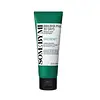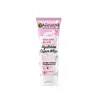What's inside
What's inside
 Key Ingredients
Key Ingredients

 Benefits
Benefits

 Concerns
Concerns

 Ingredients Side-by-side
Ingredients Side-by-side

Water
Skin ConditioningGlycerin
HumectantCentella Asiatica Extract
CleansingPalmitic Acid
EmollientStearic Acid
CleansingLauric Acid
CleansingMyristic Acid
CleansingPotassium Hydroxide
BufferingLauryl Betaine
CleansingButylene Glycol
HumectantPEG-100 Stearate
Glyceryl Stearate
EmollientBeeswax
Emulsion StabilisingMelaleuca Alternifolia Leaf Water
AntimicrobialSodium Methyl Cocoyl Taurate
CleansingPotassium Cocoyl Glycinate
Salicylic Acid
MaskingDipropylene Glycol
HumectantSodium Chloride
MaskingHydroxyacetophenone
AntioxidantMentha Piperita Oil
MaskingCaprylyl Glycol
Emollient1,2-Hexanediol
Skin ConditioningDisodium EDTA
Hydroxyethylcellulose
Emulsion StabilisingCalamine
AbsorbentGluconolactone
Skin ConditioningCitric Acid
BufferingPotassium Glycyrrhizinate
Skin ConditioningArtemisia Vulgaris Extract
Skin ConditioningMadecassoside
AntioxidantAsiaticoside
AntioxidantAsiatic Acid
Skin ConditioningMadecassic Acid
Skin ConditioningWater, Glycerin, Centella Asiatica Extract, Palmitic Acid, Stearic Acid, Lauric Acid, Myristic Acid, Potassium Hydroxide, Lauryl Betaine, Butylene Glycol, PEG-100 Stearate, Glyceryl Stearate, Beeswax, Melaleuca Alternifolia Leaf Water, Sodium Methyl Cocoyl Taurate, Potassium Cocoyl Glycinate, Salicylic Acid, Dipropylene Glycol, Sodium Chloride, Hydroxyacetophenone, Mentha Piperita Oil, Caprylyl Glycol, 1,2-Hexanediol, Disodium EDTA, Hydroxyethylcellulose, Calamine, Gluconolactone, Citric Acid, Potassium Glycyrrhizinate, Artemisia Vulgaris Extract, Madecassoside, Asiaticoside, Asiatic Acid, Madecassic Acid
Water
Skin ConditioningSorbitol
HumectantLauric Acid
CleansingStearic Acid
CleansingMyristic Acid
CleansingPotassium Hydroxide
BufferingGlycol Distearate
EmollientPalmitic Acid
EmollientKaolin
AbrasiveSodium Cocoamphoacetate
CleansingCoco-Betaine
CleansingCI 14700
Cosmetic ColorantCI 16035
Cosmetic ColorantLinalool
PerfumingNiacinamide
SmoothingParfum
MaskingSodium Chloride
MaskingSodium Hyaluronate
HumectantSodium Palmitoyl Proline
Skin ConditioningSodium Benzoate
MaskingPhenoxyethanol
PreservativePrunus Yedoensis Leaf Extract
Skin ConditioningDisodium EDTA
Limonene
PerfumingAscorbyl Glucoside
AntioxidantNymphaea Alba Flower Extract
Skin ConditioningHydroxypropyl Methylcellulose
Emulsion StabilisingCitronellol
PerfumingCapryloyl Salicylic Acid
ExfoliatingDipropylene Glycol
HumectantPolyquaternium-7
Butylene Glycol
HumectantBenzyl Alcohol
PerfumingBenzyl Salicylate
PerfumingWater, Sorbitol, Lauric Acid, Stearic Acid, Myristic Acid, Potassium Hydroxide, Glycol Distearate, Palmitic Acid, Kaolin, Sodium Cocoamphoacetate, Coco-Betaine, CI 14700, CI 16035, Linalool, Niacinamide, Parfum, Sodium Chloride, Sodium Hyaluronate, Sodium Palmitoyl Proline, Sodium Benzoate, Phenoxyethanol, Prunus Yedoensis Leaf Extract, Disodium EDTA, Limonene, Ascorbyl Glucoside, Nymphaea Alba Flower Extract, Hydroxypropyl Methylcellulose, Citronellol, Capryloyl Salicylic Acid, Dipropylene Glycol, Polyquaternium-7, Butylene Glycol, Benzyl Alcohol, Benzyl Salicylate
 Reviews
Reviews

Ingredients Explained
These ingredients are found in both products.
Ingredients higher up in an ingredient list are typically present in a larger amount.
Butylene Glycol (or BG) is used within cosmetic products for a few different reasons:
Overall, Butylene Glycol is a safe and well-rounded ingredient that works well with other ingredients.
Though this ingredient works well with most skin types, some people with sensitive skin may experience a reaction such as allergic rashes, closed comedones, or itchiness.
Learn more about Butylene GlycolDipropylene Glycol is a synthetically created humectant, stabilizer, and solvent.
This ingredient helps:
Dipropylene glycol is technically an alcohol, but it belongs to the glycol family (often considered part of the ‘good’ alcohols). This means it is hydrating and gentle on skin unlike drying solvent alcohols like denatured alcohol.
As a masking agent, Dipropylene Glycol can be used to cover the smell of other ingredients. However, it does not have a scent.
Studies show Dipropylene Glycol is considered safe to use in skincare.
Learn more about Dipropylene GlycolDisodium EDTA plays a role in making products more stable by aiding other preservatives.
It is a chelating agent, meaning it neutralizes metal ions that may be found in a product.
Disodium EDTA is a salt of edetic acid and is found to be safe in cosmetic ingredients.
Learn more about Disodium EDTALauric Acid is a fatty acid or lipid. About half of fatty acids in coconut oil is lauric acid.
This ingredient helps hydrate and sooth skin. As a humectant, it helps trap moisture. It also aids in cleaning and enhancing the texture of products.
Lauric acid may not be Malassezia folliculitis, or fungal acne, safe.
Learn more about Lauric AcidMyristic Acid is a saturated fatty acid. It is naturally found in milk fat. Other sources include palm oil, coconut oil, and butter fat.
Myristic Acid is an emulsifer and cleanser. As an emulsifer, it stabilizes a product by preventing ingredients from separating. Myristic Acid helps clean your skin by acting as a surfactant. It tends to gather oil and dirt on your skin to be easily rinsed away.
One study from 2021 found Myristic Acid to have anti-inflammatory properties.
Learn more about Myristic AcidPalmitic Acid is a fatty acid naturally found in our skin and in many plant and animal sources. In cosmetics, it is usually derived from palm oil. It serves many purposes in skincare, acting as a cleanser, emollient, and emulsifier.
As an emollient, palmitic acid helps soften and smooth the skin by preventing water loss. In cleansers, it helps remove oil and dirt while creating foam.
Its emulsifying properties help stabilize products by keeping water and oil-based ingredients from separating.
This may not be suitable for fungal acne-prone skin, as fatty acids like this can sometimes trigger breakouts in sensitive individuals.
Learn more about Palmitic AcidPotassium hydroxide is commonly known as caustic potash. It is used to fix the pH of a product or as a cleaning agent in soap. In cleansers, it is used for the saponification of oils.
Sapnification is the process of creating fatty acid metal salts from triglycerides and a strong base. During this process, Potassium Hydroxide is used up and is not present in the final product.
Using high concentrations of Potassium Hydroxide have shown to irritate the skin.
Learn more about Potassium HydroxideChances are, you eat sodium chloride every day. Sodium Chloride is also known as table salt.
This ingredient has many purposes in skincare: thickener, emulsifier, and exfoliator.
You'll most likely find this ingredient in cleansers where it is used to create a gel-like texture. As an emulsifier, it also prevents ingredients from separating.
There is much debate on whether this ingredient is comedogenic. The short answer - comedogenic ratings don't tell the whole story. Learn more about comegodenic ratings here.
The concensus about this ingredient causing acne seems to be divided. Research is needed to understand if this ingredient does cause acne.
Scrubs may use salt as the primary exfoliating ingredient.
Learn more about Sodium ChlorideStearic Acid is a fatty acid. It is an emollient, emulsifier, and texture enhancer.
As an emollient, stearic acid helps soften skin. It aids the skin's protective barrier by preventing water loss. It also provides a gentle cleansing effect without stripping away natural oils.
Stearic acid may also be used to enhance the texture of products. It can add volume and stabilize ingredients such as water and oil. This can help water and oil ingredients from separating.
Sources of stearic acid include animal or vegetable fats/oils such as coconut or shea. It can be naturally found in butter, cocoa butter, shea butter, vegetable fats, and animal tallow.
This ingredient may not be Malassezia folliculitis, or fungal-acne safe.
Learn more about Stearic AcidWater. It's the most common cosmetic ingredient of all. You'll usually see it at the top of ingredient lists, meaning that it makes up the largest part of the product.
So why is it so popular? Water most often acts as a solvent - this means that it helps dissolve other ingredients into the formulation.
You'll also recognize water as that liquid we all need to stay alive. If you see this, drink a glass of water. Stay hydrated!
Learn more about Water